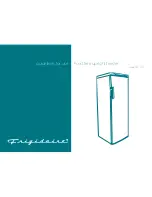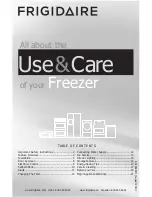
5
stopcontact trekken, stroomkabel doorknippen, eventueel aanwezige
snap– of grendelsloten verwijderen of kapotmaken. Daardoor wordt
voorkomen dat spelende kinderen in het apparaat opgesloten raken (ver-
stikkingsgevaar!) of in andere levensgevaarlijke situaties terecht komen.
• Kinderen kunnen gevaren die in het omgaan met huishoudelijke appara-
ten schuilen vaak niet herkennen. Zorg daarom voor de nodige toezicht
en laat kinderen niet met het apparaat spelen.
Bij dagelijks gebruik
• Containers met brandbare gassen of vloeistoffen kunnen lek raken door
de inwerking van koude. Explosiegevaar! Leg geen containers met brand-
bare stoffen zoals bijv. spraybussen, aanstekers, navullingen van aan-
stekers etc. in het koelapparaat.
• Flessen en blikken mogen niet in het vriesvak. Ze kunnen springen als de
inhoud bevriest – bij koolzuurhoudende inhoud zelfs exploderen! Leg
nooit limonades, sappen, bier, wijn, champagne etc. in het vriesvak. Uit-
zondering: sterke drank met een zeer hoog alcoholpercentage kan in het
vriesvak gelegd worden.
• Consumptie-ijs en ijsblokjes niet direct vanuit de vriesruimte in de mond
steken. Zeer koud ijs kan aan de lippen of de tong vastvriezen en verwon-
dingen veroorzaken.
• Niet met natte handen aan diepvriesartikelen komen. De handen kunnen
daaraan vastvriezen.
• Geen elektrische apparaten (bijv. elektrische ijsmachines, mixers etc.) in het
koelapparaat gebruiken.
• Voor het schoonmaken het apparaat altijd uitzetten en de stekker uit het
stopcontact trekken of de zekering in de uitschakelen huisinstallatie.
• De stekker altijd aan de stekker zelf uit het stopcontact trekken, nooit aan
het snoer.
Bij storing
• Als er een storing aan het apparaat optreedt eerst in de gebruiksaanwij-
zing kijken onder “Wat te doen als ...”. Als de daar gegeven aanwijzingen
niet verder helpen zelf niet verder aan het apparaat werken.
• Koelapparaten mogen alleen dooor geschoold personeel gerepareerd wor-
den. Door ondeskundige reparaties kunnen grote gevaren ontstaan. Wend
u zich bij reparaties tot uw vakhandel of tot onze service-afdeling.
32
2.
Defrost the freezer compartment prior to cleaning (see "Defrosting" section).
3.
Switch the appliance off and remove the plug from the mains, or switch off
or turn out the circuit breaker or fuse.
4.
Clean the appliance and the interior accessories with a cloth and lukewarm
water. Commercially available dish washing detergents may also be used.
5.
After cleaning wipe with fresh water and rub dry.
Accumulation of dust at the condenser increases energy consumption. For
this reason carefully clean the condenser at the back of the appliance once
a year with a soft brush or a vacuum cleaner.
Do not pull, move or damage any pipes and/or cables inside the cabinet.
Switching off the appliance
If the appliance is not going to be used for an extended period:
1.
Remove all deep-frozen packages as well as ice trays.
2.
Switch off the appliance by turning the temperature regulator to position "0".
3.
Remove the mains plug or switch off or turn out the circuit breaker or fuse.
4.
Defrost freezer compartment and clean thoroughly (see section: “Cleaning
and Care”).
5.
Leave the door open to avoid the build up of odours.
Energy Saving Tips
• Do not install the appliance near cookers, radiators or other sources of
warmth. High ambient temperatures cause longer, more frequent opera-
tion of the compressor.
• Ensure sufficient air circulation and exhaust at the appliance base and at
the back wall of the appliance. Never cover air vent openings.
• Do not place warm foods into the appliance. Allow warm foods to cool first.
• Only leave door open as long as necessary.
• Do not set temperature any colder than necessary.
• Put frozen food in the fridge to defrost. The cold in the frozen food will
then be used to cool the fridge.
• Keep the heat emitting condenser, the metall grille on the rear wall of
your appliance, always clean.




































